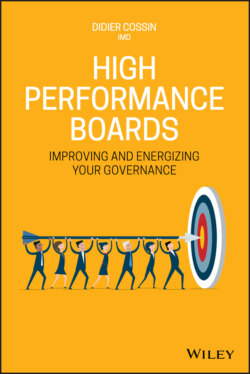Читать книгу High Performance Boards - Didier Cossin - Страница 22
Should We Trust Leaders?
ОглавлениеThe transformational leadership model relies strongly on trust, and in particular on employees trusting their leaders. Yet many inspiring and transformative leaders have changed their organisations for the worse instead of for the better. And in recent years, trust in leaders has been affected by a string of events that have negatively impacted many people's lives and well-being.
One example is the nuclear leak in 2011 at the Fukushima plant of the Tokyo Electric Power Company (TEPCO). Back in 2007, an earthquake had caused a small nuclear leak, and the company's president, Tsunehisa Katsumata, was asked to retire. However, Katsumata then became chair of TEPCO, despite his previous failure to adequately manage this risk.
Another case concerns Chinese company Sanlu, which raised protein levels in baby milk by using chemicals including melamine. The firm's top management was aware of this and informed the board, which included directors from New Zealand. Hundreds of thousands of babies were affected, and Sanlu's board voted to recall all the products in question. However, because the crisis happened just before the 2008 Beijing Olympic Games, the company's chair at the time reversed the board's decision in an attempt not to harm China's reputation. Six babies subsequently died after consuming the milk. After being informed by the New Zealand government, the Chinese authorities intervened. At the time of writing, the chair is in jail and the company no longer exists.
Many other large organisations have been hit by scandals related to governance risk in recent years. They include Volkswagen, Boeing, BP, Olympus, Goldman Sachs, Adecco, Lehman Brothers, and Oxfam, to name just a few.
Little wonder, then, that many people are increasingly reluctant to trust leaders and their decisions. According to the Edelman Trust Barometer, employees have grown more distrustful and sceptical of institutions and leadership. Nearly one in three don't trust their employer. And more than two-thirds feel that CEOs are too focused on short-term performance. As a result, employees are far less likely to say positive things about the company they work for.3
In addition, economic shifts mean that leaders' unwise decisions can now hurt their organisations even more than previously. These days, the market value of companies is mostly based on intangible assets such as knowledge, goodwill, brand, and R&D (Figure 2.2). The quality of decision-making at the top is therefore critical. Intangible assets are typically more sensitive to decision-making than tangible, hard assets are.
Figure 2.2 Components of S&P500 Market Value.
Source: Ocean Tomo LLC
